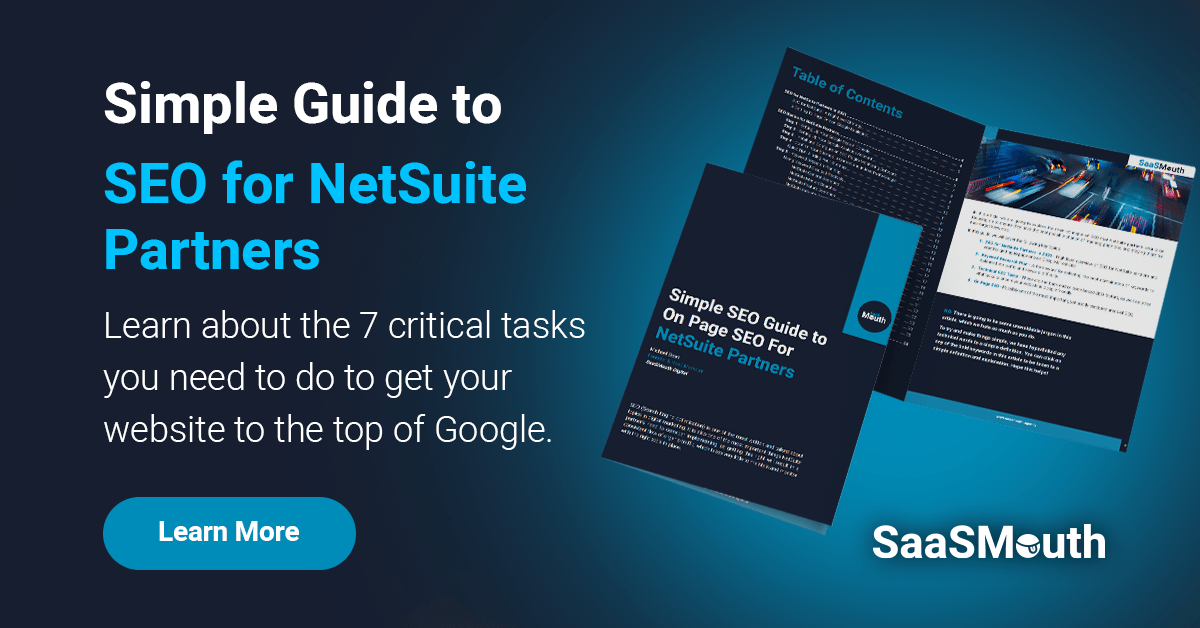The NetSuite Channel Partner community has always played an important role in NetSuite’s impressive growth across hundreds of countries and in various market horizontals and verticals.
Since its launch in 1998, Oracle NetSuite has grown to be one of, if not, the most successful cloud software ERP applications in the world. NetSuite boasts extraordinary year on year growth across all SaaS key performance factors including recurring revenues, client logo count and total user base.
Since it’s acquisition by Oracle in 2016 NetSuite has campaigned aggressively world-wide to onboard as many solution provider, implementation and alliance partners as possible with the aim to further increase software sales through the channel partner community. In 2021 there are currently upwards of 400 NetSuite channel partners globally, each seeking to make their mark as
NetSuite ERP System experts and expand their practices by solutioning, selling and implementing the world’s leading cloud ERP solution.
However, in an increasingly competitive NetSuite community, how do channel partners differentiate themselves in a way that helps them stand out from the crowd? Whilst there are hundreds of strategic and tactical marketing initiatives to be discussed, (and will be in our future articles) the one core change that NetSuite partners can make to give them the best possible chance of deep market penetration is ‘micro-verticalization’.
Micro-Vertical Marketing Explained
Micro-verticalization is a relatively new term in marketing, however simply put, micro-verticalization is:
“the process of further grainularizing horizontal and vertical markets into hyper targeted segments with the goal of solely focussing marketing efforts, sales pitches and solutioned outcomes to the needs of this very specific type of business.”
For example, NetSuite Manufacturing Edition is a fairly comprehensive business management platform for many different types of manufacturers. However, as any NetSuite Partner who has attempted to market and sell into this horizontal will tell you, the complex and specific needs of manufacturers can rarely be met with a standard MRP. In most cases, heavy customisation of NetSuite is needed to bring a customer a solution that would be considered to satisfy NetSuite’s core marketing pillar of being a “single business management platform”.
What about NetSuite’s vertical focused editions?
In some regions (USA & EMEA), NetSuite offers a wider range of “editions” that do make some headway in further aligning the platform to the needs of the industry. These NetSuite editions have some additional features, roles, reports and custom fields that more closely align the solution to the needs of a more specific type of client, however they do not go to the level of specificity that would help align the marketing messaging and overall solution to a specific micro-vertical. .
We’re already targeting verticals? Isn’t that enough?
In our opinion, no, but it depends on what your goals are. Most NetSuite partners through a combination of their team’s, customer’s and partner’s networks will be able to generate enough leads and new business to keep the doors open with modest growth. If this is your business’ goal, then feel free to stop reading.
Most NetSuite partners apply the ‘Vertical Market Development’ approach to marketing as this closely aligns with NetSuite’s go to market strategy when it comes to product development and sales and marketing efforts.
Whilst there is an amazing range of verticalized marketing collateral available to channel partners through NetSuite’s SuiteLife program, when both NetSuite Direct and the entire partner community are pushing the same content, the same brochures and the same messaging, the impact can be diluted, ineffective and lead generation can become a product of ‘right place at the right time’ rather than the strategic and laser focussed engine it can be.
How to Get Micro-Vertical Marketing Right
The underlying premise of micro-vertical marketing is that when designing your marketing messaging and engine, you are doing so with a very specific type of business in mind.
The aim of MV marketing is to become so specific with your messaging that any campaign speaks directly to your ideal client persona, as if it had been written for them within the specific context of their business, not the generalised context of their vertical or horizontal industry.
Note: We will explore defining ICP’s in an upcoming article. Join Our NetSuite Marketing Insider’s To Keep Up To Date With Our Latest Articles & Advice
What are the Objectives of Micro-Vertical Marketing?
Surprisingly, the objective of micro-vertical marketing is not to generate new leads. New leads are the result of micro-verticalized marketing, not the objective.
The objective of micro-vertical marketing is to demonstrate expertise that is relevant to the specialized requirements of a micro-vertical customer. Educational content relevant to these requirements is key. If executed effectively, your practice will be perceived as a subject matter expert (SME), and ideally, the thought leader for that micro-vertical.
In addition to this, any enhancements or micro-vertical specific functionality that is developed for customers can be used as a differentiating factor in marketing and during the sales process, helping to further solidify the alignment of your specific solution. Once achieved, your practice can rise to the top of the consideration set, reducing or eliminating competitors, speeding up the sales cycle, and ultimately driving more and better business.
Organic Digital Marketing is ineffective. Shouldn’t we just increase our advertising budgets?
It is true that most marketing channels, including inbound, outbound and social media, are becoming overwhelmed with volume rather than quality. This does not mean that a well designed, carefully crafted campaign will not perform in any or all of these channels.
On average, a social media post has less than 1 second to grab the attention of a viewer and compel them to explore the post more. In addition to this, social posts have around 1 to 2 hours to gain attention, interaction and engagement before they are pushed further down the wall for newer, fresher content.
When looking into the anatomy of a post, there are a number of key elements that need to be perfected in order to increase your audience's engagement.
- Imagery
- Headline
- Subline
- Call To Action
- Authority Builders
These five elements, when designed with a micro-vertical approach in mind, offer NetSuite marketers a huge opportunity to differentiate themselves from their competitors and speak directly to the audience they are trying to target.
What makes a Social Media Marketing Post OK, Good or Outstanding?
Example 1 - Horizontally Targeted Post
Here we see a classic example of a horizontal marketing message in the form of a LinkedIn post. Now, there is nothing specifically wrong with this. All of the elements of a “good post” are there. We are highlighting the breadth of functionality offered by NetSuite Manufacturing Edition, it touches on the benefits of a single platform approach. We have a clear call to action and great partner branding.
This example potentially speaks to any manufacturer who might be looking to upgrade their software, and if they have previously heard about NetSuite they might just click through for more information.
These types of posts do work on occasion. They do generate interest and traffic
IF they come across the feed of the right person, in the right role, in the right industry who is looking for a manufacturing ERP right now.
However, from a targeted audience perspective, there really isn’t anything that builds authority or is more unique than what NetSuite direct marketing is already doing, or what the overwhelming majority of the NetSuite channel partners are also already doing.
Example 2 - Vertically Targeted Post
The above example attempts to get more targeted, but still in a ‘capture all’ kind of way. The impact of the message is better than the horizontal approach, but realistically the size of the market that this addresses makes it next to impossible to run paid boosts or create target audience lists which means we can’t be certain that the impressions and clicks it generates are coming from the ideal type of prospect we are wanting to attract.
As good as NetSuite is as a solution for a lot of manufacturers, there are countless types of manufacturing companies, including boat builders, that this solution, without significant customization would not suit. By generating interest and leads from these types of businesses, we are not only wasting our marketing dollars, but also increasing our sales teams workloads in qualifying, exploring and ultimately rejecting a lead as their requirements do not align with the solution.
Example 3 - Micro-vertical Targeted Post
Whilst this may not look exciting at first glance, this post is a great example of marketing that has been designed to grab the attention of a very specific target. Here, we considered the core needs of our target prospect, satisfied that core need with business outcomes (not modules or features) as well as included imagery that is very specific and relatable to their day to day work life.
In our experience, posts that aim to offer this level of relatability consistently perform and succeed in the goal of generating clicks and traffic back to a point of conversion, such as a Micro-vertical industry landing page or industry blog post.
Does Micro-vertical marketing work?
Micro-vertical marketing can be effective in many categories of business. The key to defining the right micro-vertical is ensuring your team has significant experience within the industry, that you have developed some kind of enhancement or IP that other partners or NetSuite direct are unable to market and sell, and that there are enough businesses in the market to provide consistent leads from marketing spend.
Because of the granular nature of the marketing effort, MV marketing requires deep product knowledge and skill to identify viable markets, and execute the proper marketing mix.
The objective of micro-vertical marketing is that if implemented correctly, the (micro-vertical) marketer can rise to the top of the “consideration set”, reducing or even eliminating competition, speeding up the sales cycle, and ultimately driving sales success.
At SaasMouth Digital, we help our customers to understand and analyze their client base, identify the best micro-verticals to target, and design effective MV marketing engines with the goal of generating consistent lead flow in our clients chosen target markets.
If you are wondering whether micro-vertical marketing works, ask yourself the following question; As a NetSuite Partner, has this article grabbed your attention, helped you understand our approach and methodology, perhaps piqued your interest and elevated our message above the thousands of digital agency marketing messages you receive in a day? If this answer is yes, feel free to reach out for an obligation free consultation. We’re here to help.















